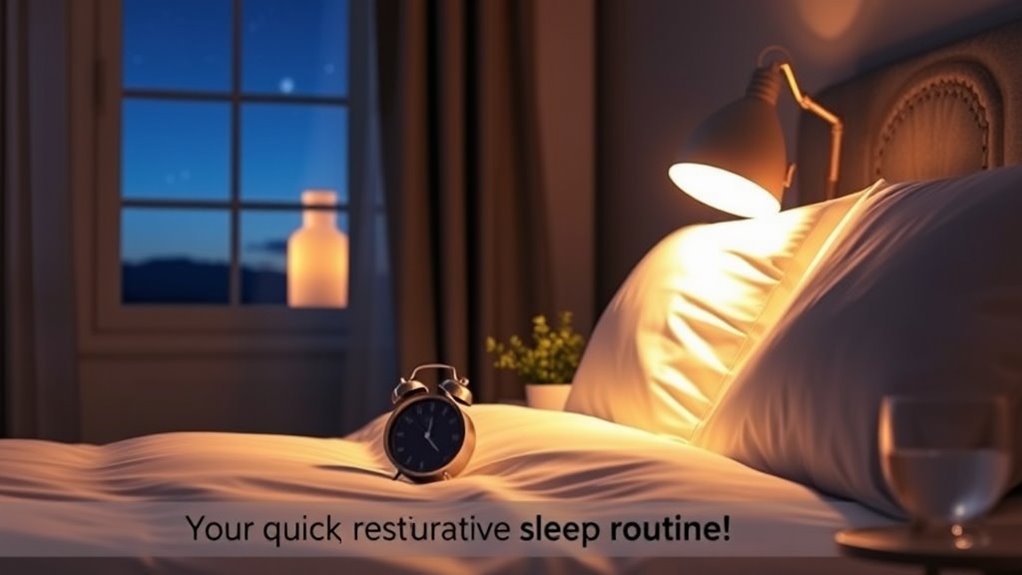To give your sleep hygiene a quick 10-minute boost, start by creating a relaxing environment—dim the lights, set the temperature between 60-67°F, and eliminate noise with earplugs or white noise. Then, establish a calming routine like gentle stretches or soft music, and avoid screens or caffeine. Focus on consistency and small adjustments; these simple steps can transform your sleep. Keep going, and you’ll discover even more ways to improve your rest.
Key Takeaways
- Set a consistent bedtime and wake time, including weekends, to strengthen your body’s sleep-wake cycle.
- Create a calming pre-sleep routine with activities like reading or gentle stretching, avoiding screens and blue light.
- Optimize your sleep environment: keep the room cool, dark, and quiet using blackout curtains and white noise if needed.
- Practice relaxation techniques such as deep breathing or meditation to reduce anxiety and promote easier sleep onset.
- Avoid stimulants like caffeine, heavy meals, and alcohol close to bedtime for a smoother transition into restful sleep.
Quick 10-Minute Sleep Hygiene Boost

Getting quality sleep doesn’t have to take hours of effort. Sometimes, a quick 10-minute tune-up can markedly improve your sleep hygiene, making falling asleep easier and waking up more refreshed. The first step is to optimize your sleep environment. Think of your bedroom as a sanctuary designed for rest. Keep the room cool, ideally between 60-67°F, to help your body’s temperature naturally drop, signaling it’s time to sleep. Eliminate noise by using earplugs or a white noise machine, and block out light with blackout curtains or a sleep mask. These simple adjustments reduce disruptions and create a serene space where your body can relax fully.
Next, focus on establishing effective bedtime routines. Consistency is key; try to go to bed and wake up at the same time every day, even on weekends. This helps regulate your internal clock, making it easier to fall asleep and wake up naturally. About 30 to 60 minutes before bed, start winding down. Avoid screens—phones, tablets, and computers emit blue light that hampers melatonin production, the hormone responsible for sleep. Instead, engage in calming activities like reading a book, gentle stretching, or listening to relaxing music. These routines signal to your brain that it’s time to prepare for sleep, making the transition smoother.
Incorporate habits that promote relaxation into your bedtime routines. Deep breathing exercises, meditation, or journaling can help clear your mind of racing thoughts, reducing anxiety that might keep you awake. Avoid caffeine, heavy meals, and alcohol close to bedtime, as they can interfere with your ability to fall asleep or stay asleep through the night. Instead, opt for a light snack if you’re hungry and stay hydrated earlier in the evening to prevent waking up thirsty. Additionally, understanding projector technology can help you choose the best equipment for a relaxing movie night, enhancing your overall sleep environment.
Finally, stick to your routine consistently, even on weekends. This consistency reinforces your body’s natural sleep-wake cycle, making it easier to drift off and stay asleep. Remember, tiny adjustments to your sleep environment and bedtime routines can have a big impact on your sleep quality. In just a few minutes, you can create a more conducive setting that signals your body it’s time to rest. With a little effort, you’ll find yourself falling asleep faster and waking up feeling more energized—no long, complicated rituals required.
Frequently Asked Questions
Can a Quick Sleep Boost Have Long-Term Effects?
A quick sleep boost can positively impact your sleep quality over time if you make it part of your bedtime routines. Short naps or relaxation techniques help refresh your mind and body, leading to better rest. Consistently incorporating these habits can improve your overall sleep hygiene, making it easier to fall asleep and stay asleep long-term. So, even a brief boost can contribute to healthier sleep habits and better sleep quality.
Should I Do the Routine on Weekends Too?
Yes, you should do the routine on weekends too. Maintaining weekend consistency helps your body stay in sync and reinforces your sleep habits. However, allow some routine flexibility if needed, so you don’t feel pressured. This balance ensures your sleep hygiene stays strong and adapts to your lifestyle, making it easier to fall asleep and wake up refreshed every day. Consistency with some flexibility is key to better sleep.
What if I Can’T Fall Asleep After the Boost?
If you can’t fall asleep after the boost, try a calming activity like deep breathing or reading to improve sleep quality. For example, Sarah struggled with sleep despite her bedtime routines, but calming techniques helped her relax. Stick with your routines consistently, and consider adjusting your bedtime to find what works best. Remember, patience is key—sometimes it takes time for your body to fully relax and settle down.
Is This Method Suitable for Shift Workers?
Yes, this method can help shift workers, but you need to adapt it to tackle shift work challenges and circadian disruption. Use it during your rest periods, even if they’re irregular, and create a consistent pre-sleep routine to signal your body. Adjust lighting and sleep environment to align with your schedule, and stay consistent. These tweaks can improve your sleep quality despite the complexities of shift work.
How Often Should I Repeat the Quick Boost?
You should repeat the quick boost as often as needed, ideally once or twice a day, especially if your sleep environment or relaxation techniques aren’t enough to improve your sleep. Pay attention to how you feel afterward, and adjust accordingly. Regularly practicing these tips helps reinforce your sleep habits, making it easier to relax and fall asleep. Remember, consistency is key to maintaining better sleep hygiene.
Conclusion
Think of your sleep routine as a garden—you need to tend to it regularly to keep it healthy and thriving. Just a quick 10-minute tune-up can clear away the weeds of bad habits and plant seeds for better rest. By making small changes today, you’ll nurture a peaceful, restorative sleep that blossoms night after night. Remember, even the tiniest effort can turn your sleep into a beautiful, flourishing garden. Start now, and watch your nights transform.








